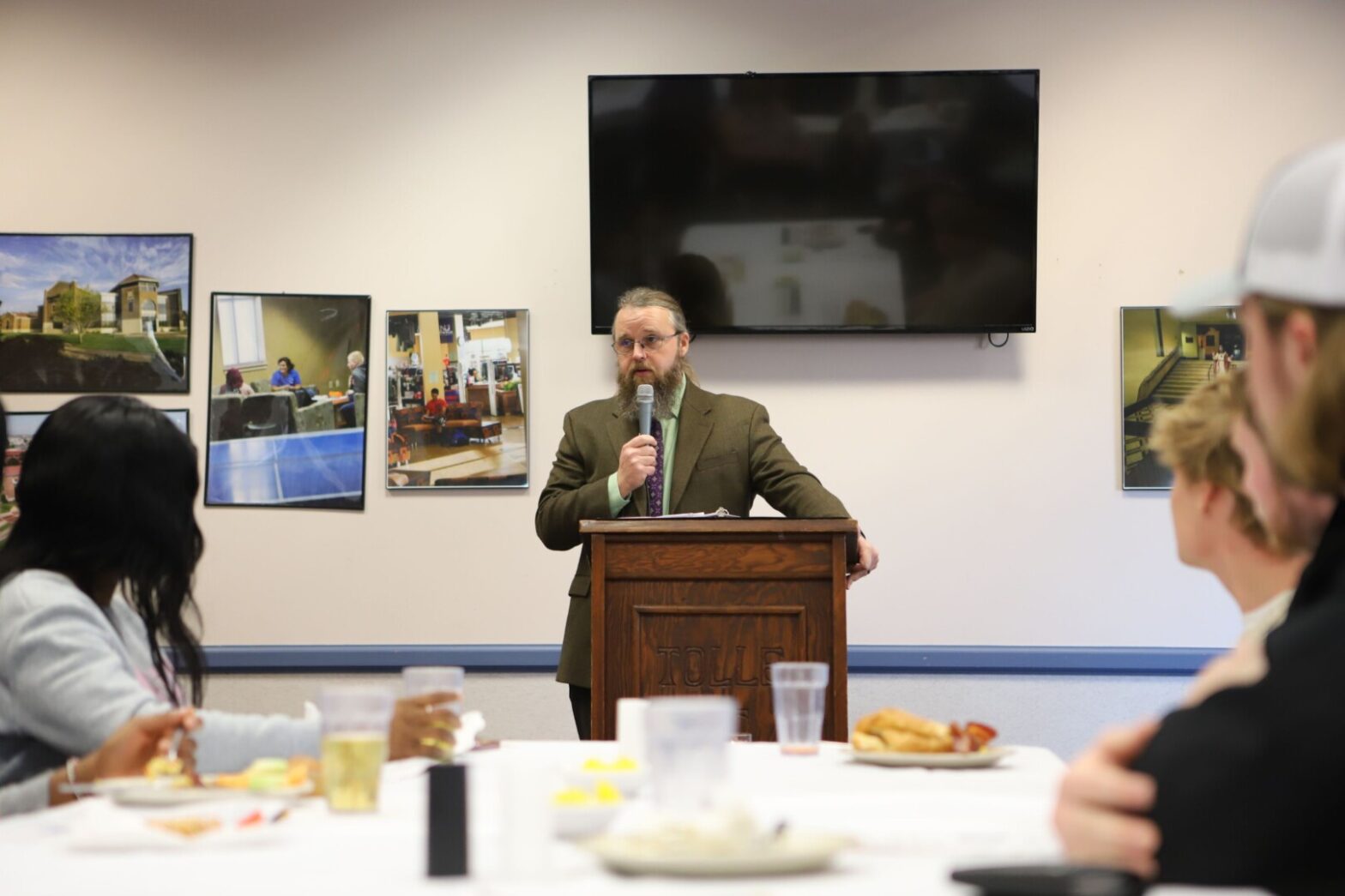Prayer is the only means of bringing about orderliness and peace and repose in our daily acts.”
Mahatma Gandhi
More than 40 students, faculty and staff gathered for the annual prayer breakfast Nov. 15 in the Mabee Dining Center at Newman University.
The theme of the prayer breakfast was peace, and the event followed the tradition of ecumenical prayer, reflections and song. Great Western Dining served a hot breakfast for all to enjoy, and the Student Diversity Committee organized the event.
“With the world’s situation being what it is this year, particularly with the Israel-Palestine and the Ukraine-Russia conflicts, we have chosen peace as our theme,” Sister Therese Wetta, ASC, shared in an introduction.
“Jesus tells us in the Gospel of John, ‘I have told you all this so that you may have peace in me,’” first-year student Joe Davis said. “‘Here on earth you have many trials and sorrows, but take courage because I have overcome the world.’”
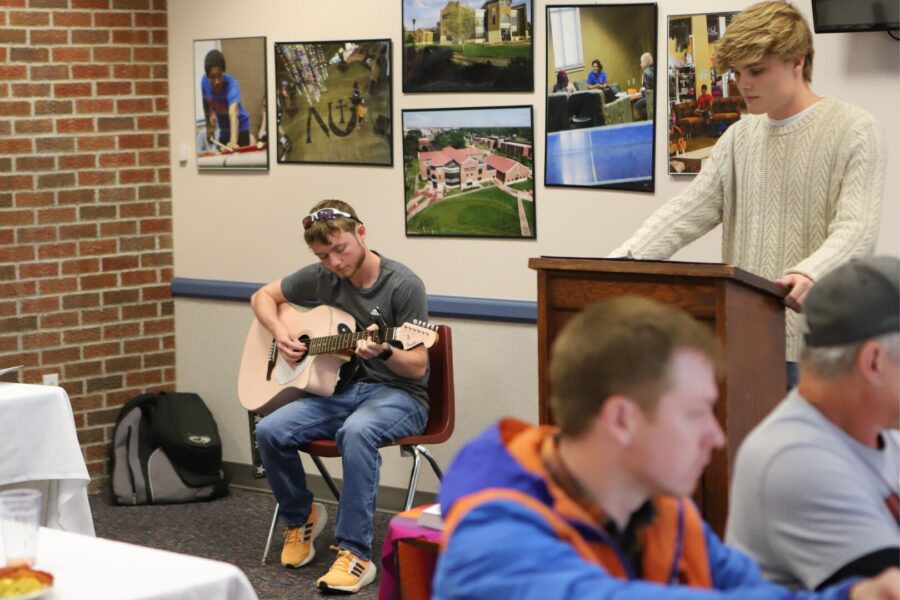
Guests joined in singing “Prayer for Peace” by David Haas, accompanied by first-year student Hunter Lough on the guitar. Professor of Education Janet Jump then shared a reading from the Gospel of John:
“On the evening of the first day of the week when the doors were locked where the disciples were for fear of the Jews, Jesus came and stood in their midst and said to them, ‘Peace be with you,’” Jump read. “When he had said this, he showed them his hands and his side. The disciples rejoiced when they saw the Lord. Jesus said to them, again, ‘Peace be with you as the Father has sent me. So I send you.’ And when he said this, Jesus breathed on them and he said to them, ‘Receive the Holy Spirit.’”
Professor of Theology Matthew Umbarger, who lived in Israel for nine years, shared a personal reflection on peace.
“A very wise man once told me that if someone spends a week touring Israel, they go back home and write up an article pontificating on the political climate,” Umbarger began. “If they spend a month, they might write a book. But when someone has lived 10 years there, all they can do is keep their mouth shut. So I suppose that since I came back home just short of the necessary decade, I probably have too much to say.”
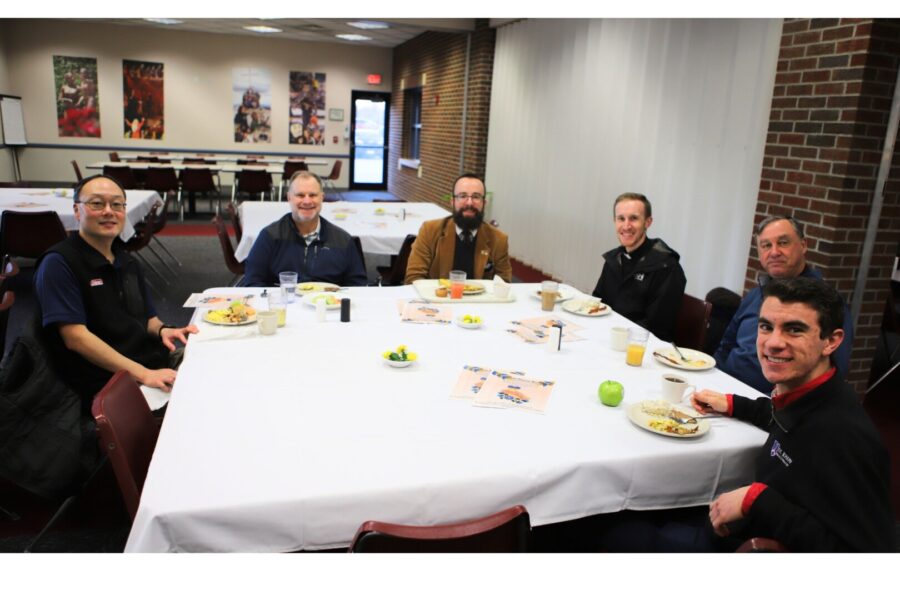
Umbarger explained that he is not afraid of the gospel, for it is “the power of God for salvation to everyone who has faith.”
He continued, “As a young ambitious man, these words of St. Paul from the book of Romans lit a fire in me and propelled me into a career of mission work in Israel. Indeed, I was not ashamed of the gospel when I left for Israel as a naive young man 22 years ago, wife and baby girl in tow.”
He spoke of the struggles he encountered when trying to proclaim the gospel with others, and the expectations he had versus the reality that “neither Jews nor Muslims wanted to hear about what Jesus meant to me.”
“My head was full of romantic visions of pious rabbis having conversations with me about Messianic prophecy and noble Muslims listening to me testify to the redeeming power of Jesus. On the contrary, I had experiences like these: a Jewish professor that opened every class session with jokes making fun of Jesus and Mary, Muslim kids in Jerusalem who spat on me whenever I entered and exited a church in the Muslim quarter. I was perplexed because I had romanticized the peoples of Israel. So I was deeply offended when they did not behave the way that I had expected. I had projected my gospel values onto them. I think that this is the lesson that I’ve learned from this: being a peacemaker means accepting people where they are. I have been reminded of this recently as I witnessed the perplexity of the west in view of the Israel-Hamas war.”
As a Christian who wants to love and engage with Jews and Muslims, Umbarger said he is temped to turn his gaze away from difficult realities such as this. But he also knows that “accepting Jews and Muslims on my terms and not their own is not fair to them.”
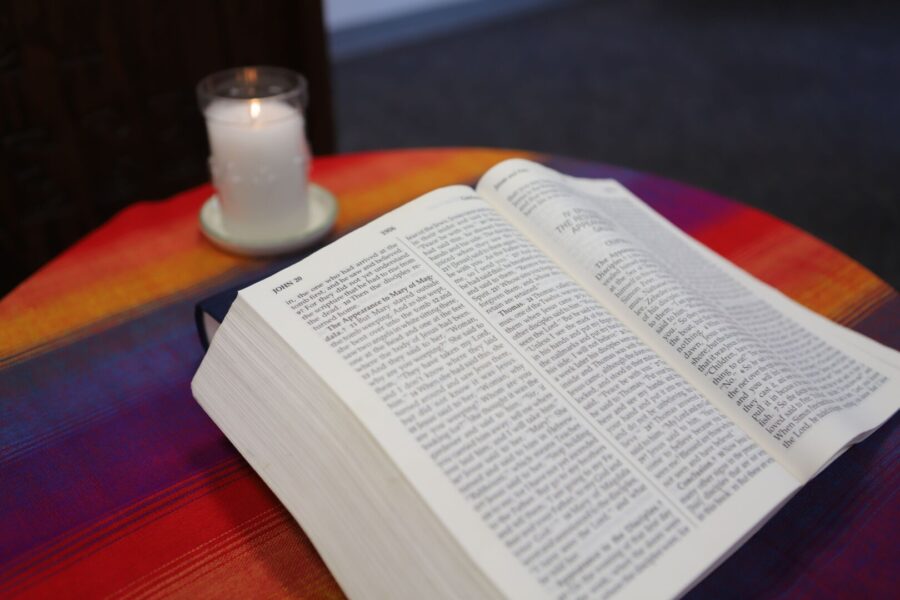
“Blessed are the peacemakers, for they shall be called sons of God,” Umbarger said. “Of course, we know what happened to the son of God. Being a peacemaker means getting bloodied, allowing yourself to be pulled and contorted by and tortured by the different sides because we refuse to take one side.”
Umbarger concluded, “Yes, I was offended by what they had to say. It even hurt. But authentic encounter has to hurt. When God made himself vulnerable in Jesus Christ, we hurt him and yet he endured it because of the joy set before him as a disciple of Jesus. I’m called to that same vulnerability in view of the same joy.”
Together, first-year students Tryphena and Tryphosa Kayode shared a reflection about a conflict in their home country, Nigeria, that began in 2009: the Boko Haram insurgency. Tryphena explained that the Boko Haram is an Islamist militant organization that was originally founded by a man called Mohammed Yusuf.
“Since the insurgency started in 2009, Boko Haram has killed tens of thousands of people in frequent attacks against the police, armed forces and civilians,” Tryphena said. “It has resulted in the deaths of more than 300,000 children and has displaced 2.3 million from their homes. This group has contributed to regional food crisis, family displacement and displacement of education for the northeastern parts of Nigeria.”
Despite the catastrophic damages that continue to have ripple effects, Tryphena drew attention to the group of people who came together from all over the world — and even within Nigeria — to restore some sense of normalcy and peace to the victims and families who were affected.
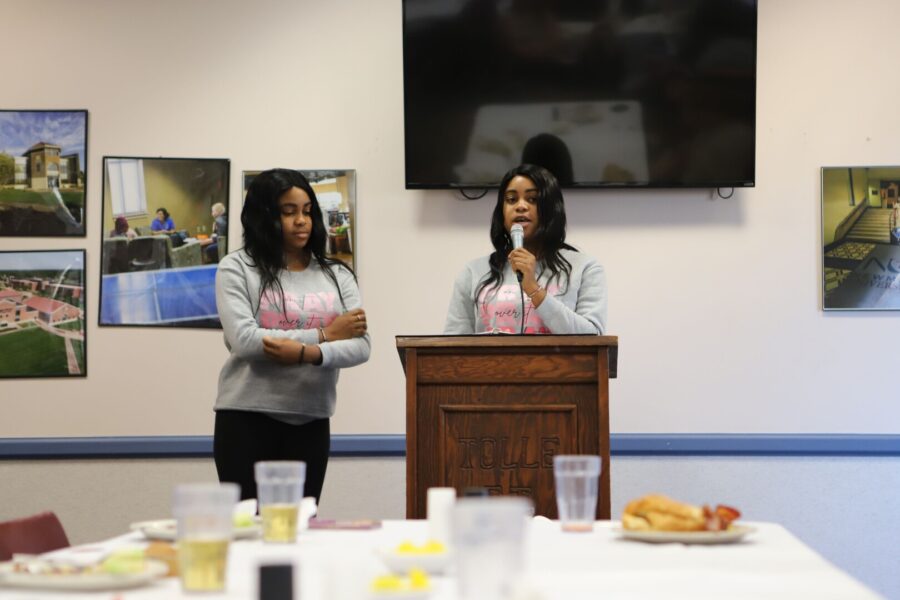
“The United Nations provided emergency funds for tens of thousands displaced by Boka violence,” Tryphena said. “So many churches organized prayer services for the nation to pray for peace and wisdom for the government to make decisions that would positively impact the nation. To this day, the body of Christ in Nigeria still holds up to God’s premise in Micah 4:3 that says, ‘The Lord will mediate between peoples and will settle disputes between strong nations far away. They will hammer the swords into plow shares and their spears into pruning hooks. Nation will no longer fight against nation, nor train for war anymore.’”
Tryphosa contributed her own thoughts to the reflection, noting that, as people love themselves over God and their neighbors, they are driven to hate their neighbors, much less their enemies. This shift, she said, contributes to war and unrest.
“With all of this going on, it can be difficult to maintain peace within ourselves,” Tryphosa said. “We need a higher force, a higher power, which is God to calm the storm’s problems and difficulties we may be going through. The peace that comes from God is called divine peace, and is unlike any natural peace because it is unconditional.”
We need a higher force, a higher power, which is God to calm the storm’s problems and difficulties we may be going through.
Tryphena Kayode
Some may assume it was easy for Jesus to offer peace, because “this is Jesus we’re talking about,” Tryphosa said. “I mean, he’s God. He was embodied with peace from the start.”
But Tryphosa also gave an example of an individual referenced in the Bible who was God-fearing and struggled greatly to maintain peace: Job.
“Whether it was losing his source of livelihood, losing his children or failing health, Job went through it all like everyone else,” Tryphosa said. “Job felt lonely. He felt rejected and sad. God reminded him that he was still God and that he was the one who gave and took away. In Job 42 from start to finish, we can see that he finally realized that God is indeed the ultimate and that he can change things around. Job finally found peace in the fact that God was with him through thick and thin.”
Together, members of the Newman community prayed, “God, release us from our darkness within, that we may extend your peace to the world. You, oh God, are our peace and light. With you, we can do all things.”
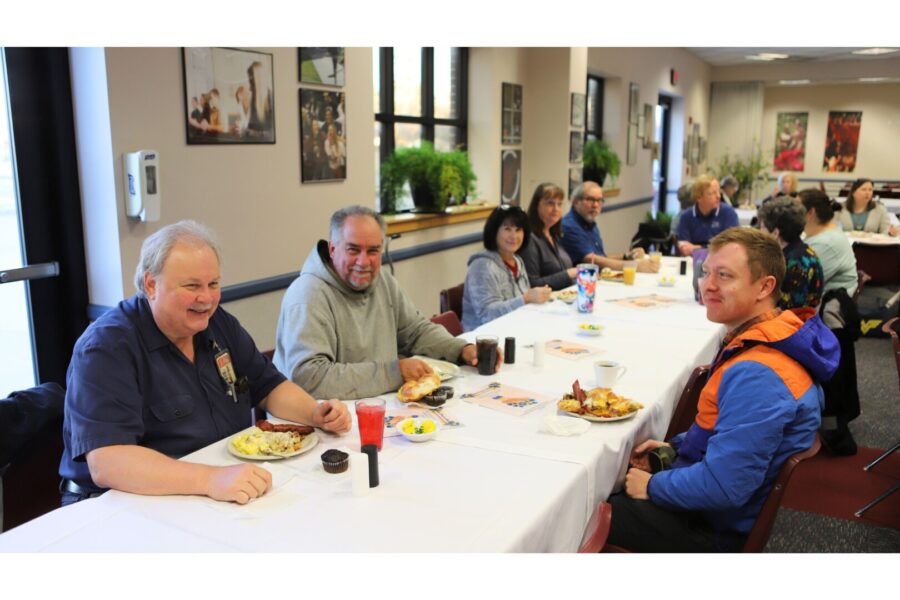
Every person in the room stood to face each other across the table and exchange peace using the words of Gandhi:
I offer you peace.
I offer you love.
I offer you friendship.
I see your beauty.
I hear your need.
I feel your feelings.
My wisdom flows from the highest source.
I salute that source in you.
Let us work together for unity and peace.”
Mahatma Gandhi
Apply to Newman University
Experience a super-charged student support and success program designed to help you thrive in a rapidly changing world.
